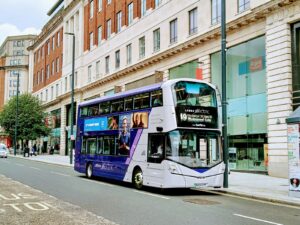We need an outbreak of evidence-based realism in the Government’s Joint Air Quality Unit (JAQU), writes Chris Ashley, head of policy on the environment and regulation for the Road Haulage Association.
As ministers develop their ‘build back greener’ agenda, they must set out a clear roadmap on how we get there. Ill-thought-out road space ‘reallocation’ schemes that local authorities are adopting are not filling us with confidence. Transport firms driving the recovery face more congestion as roads and key lanes close to traffic with little notice and no consultation.
As a colleague recently wrote: ‘transport’s a good thing: it connects people with employment and businesses with customers. It’s fundamental to our way of life and our wellbeing.’ Those words remind me how critical economic wellbeing is for a sustainable future. Focusing only on environmental concerns isn’t sustainable and will lead to many undesirable consequences — including for the environment.
Let me be clear — we support the policy aim to improve air quality and the Government’s broader ‘green recovery’ ambitions.
In January, we published Eliminate | Minimise | Offset which sets out our vision on decarbonising freight and logistics. We’ve just followed it up with our annual NOx emissions assessment which, based on government data, shows that NOx emissions from HGVs have fallen by at least 59% since 2013. So our industry is certainly taking a lead.
Travel patterns have changed in ways unimaginable just seven months ago.
We hear reports that air quality has substantially improved, that travel patterns will change over the short and medium-term. But we’re seeing inertia from a JAQU still forcing local authorities to deliver plans for clean air zones that were devised in a different world.
We’re dismayed that officials press on with pre-COVID plans to roll-out the flawed and counter-productive schemes next year – leaving struggling firms to face deliberately punitive bureaucratic processes and one-size-fits-all charging that conspire to put them out of business.
Worse still, we understand JAQU is advising councils to leave out possible economic impacts of COVID-19 in assessments and decision-making.
This defies belief given the claimant count for out-of-work benefits has doubled to nearly 3 million before the furlough scheme has even been wound-up. It suggests that ministers and officials are driven by an anti-vehicle, anti-freight dogma that’s out of touch with economic reality and ordinary people’s needs for mobility.
The Government can and must do better. As a first step, we urge Ministers to pause and review CAZ policy so they can understand the causes of the improved air quality during the pandemic, recalibrate their evidence-base and policy approach, and then instruct local authorities accordingly.
Next, lessons learned from the CAZ experience can inform the prime minister’s ambition to ‘build back greener’ but it needs JAQU, DEFRA and DfT to change course.
The ‘green recovery’ must be sustainable and driven by sensible policy frameworks that nurture economic growth. We’re clear that sustainability means balancing environmental, social and economic wellbeing and recognising they’re interdependent.
With the Government determined to carve a green role for the UK internationally, we urge ministers to act as champions of a recovery which delivers a predictable regulatory framework so freight operators and others can invest with confidence in cleaner low-carbon technology. The market can then shape and provide the green innovations and solutions that our economy needs.
The good news is that good practice already exists. We commend the development of the Euro VI/6 standard as a model for policymakers to adopt.
In this instance, a well-designed standard led by business in a stable regulatory environment required vehicle manufacturers to develop new technology which has generated significant reductions in NOx air pollution. It is this consistent improvement of standards over time that has driven the huge fall in NOx from lorries.
We should continue building on what is proven to be effective.
By contrast, a simplistic approach from the State to devise environmental solutions is ill-advised, because the Government’s interventionist track-record is poor. Past IT projects show policymakers often fall into the trap of being seduced by the potential of technology whilst overlooking actual market need or deliverability.
The tragedy of CAZ is that a healthy and supported market could have delivered the pollution reduction policymakers wanted from our sector. But bureaucrats intervened and designed a scheme that’s treated all pre-Euro VI fleet the same — overlooking emissions and vehicle life cycles.
The list of policymakers’ mistakes is eye-opening: failures to assess long-term NOx reduction trends from HGVs, understand asset life cycles and how they’re replaced, anticipate the supply of the desired technology, and phasing in the policy. But above all, it’s a failure to trust that the market, not policymakers alone, can come up with the solution.
The consequence is £1.2bn prematurely wiped from the value of the Euro V fleet as hauliers looking to upgrade are stuck with trucks no-one wants with business finances damaged.
The ‘net zero’ debate gives us even more cause for concern where ministers seem intent on a one-size-fits-all electric solution. Yet the market is developing flexible, dynamic options to decarbonise the economy, ranging from automation, modal shift and traditional road freight powered by alternative fuels.
These options require a government willing to provide regulatory certainty against which operators can invest to satisfy complex customer needs, not a government intent on ‘picking winners’. For haulage that means having a framework which respects asset lifecycles of at least 12 years.
The Government’s green aspirations are ambitious and we’re excited by them, but COVID-19 has changed the economic landscape and CAZ has undermined haulier ability to invest. We urge ministers to change tack, base their policies on the latest evidence and recognise that causing ‘stranded assets’ which leave firms stuck with older, more polluting vehicles is wasteful and bad for a sustainable greener future. The market can deliver the healthy environment we all want — it requires an alignment of a political strategy to support it.
Photo Credit – Pixabay

















Leave a Reply